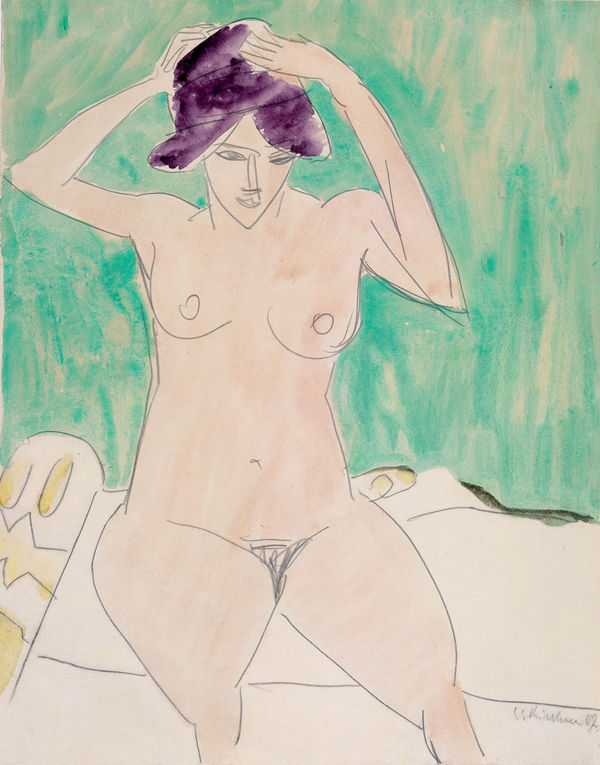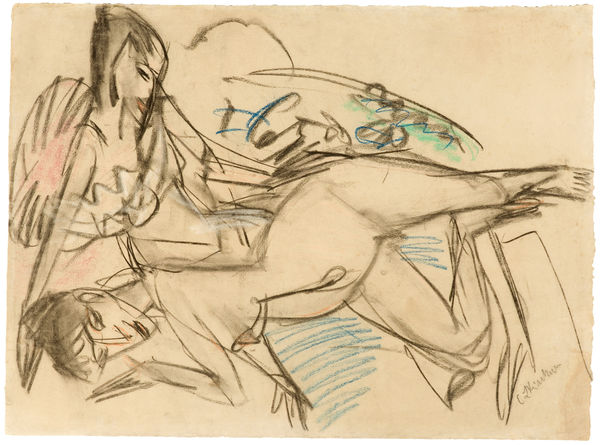ERNST LUDWIG KIRCHNER German, 1880-1938
"Art is made by humans. Art's own form is the centre of all art, for its form and its measure are the basis and starting point for all feeling."
Ernst Ludwig Kirchner was a German Expressionist artist known for his paintings and prints. Using lively brushwork, stylized forms, and vivid colors, he depicted portraits, landscapes, and city scenes as seen in his seminal painting Street, Dresden (1908). “A painter paints the appearance of things, not their objective correctness,” he mused. “In fact he creates new appearances of things.” Born on May 6, 1880 in Aschaffenburg, Germany, he studied architecture at the Königliche Technische Hochschule in Dresden before turning painting. Finding inspiration in the works of earlier German artists such as Albrecht Dürer, he was profoundly influenced by the expressive use of color in the work of Vincent van Gogh and Edvard Munch. Like the French avant-garde, Kirchner incorporated aesthetic attributes of traditional African and Oceanic art into his developing style. In 1905, he helped to found the Die Brücke group, along with Fritz Bleyl, Karl Schmidt-Rottluff, and Erich Heckel. This group acted as a collaborative workspace in Dresden where he and his colleagues led a bohemian lifestyle which included nudity, polyamorous relationships, and a reverence for freedom. Plagued by troubled mental health throughout his life, Kirchner committed suicide on June 15, 1938 in Frauenkirch, Switzerland. Today, his works are included in the collections of the Art Institute of Chicago, The Museum of Modern Art in New York, the Städel Museum in Frankfurt am Main, and the Albertina in Vienna, among others.
-
 ERNST LUDWIG KIRCHNERFrau mit schwarzen Strümpfen ( Die schwarze Grete), 1909Oil on cardboard on canvas51 x 72,4 cm
ERNST LUDWIG KIRCHNERFrau mit schwarzen Strümpfen ( Die schwarze Grete), 1909Oil on cardboard on canvas51 x 72,4 cm
20 1/8 x 28 3/8 in -
 ERNST LUDWIG KIRCHNERFrau mit Hut, 1909/10Watercolor, pencil and crayon on paper32,7 x 26,4 cm
ERNST LUDWIG KIRCHNERFrau mit Hut, 1909/10Watercolor, pencil and crayon on paper32,7 x 26,4 cm
12 5/8 x 10 1/4 in -
 ERNST LUDWIG KIRCHNERZwei Frauen auf dem Sofa, 1914Color crayon and pencil on paper50,6 x 66,9 cm
ERNST LUDWIG KIRCHNERZwei Frauen auf dem Sofa, 1914Color crayon and pencil on paper50,6 x 66,9 cm
19 3/4 x 26 in -
 ERNST LUDWIG KIRCHNERLiegende Akte, ca. 1912Crayon and pastel on paper51 x 68 cm
ERNST LUDWIG KIRCHNERLiegende Akte, ca. 1912Crayon and pastel on paper51 x 68 cm
20 1/8 x 26 3/4 in






